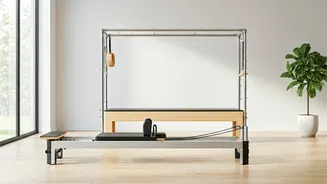Pilates: What Is It?
Pilates is a system of exercises that focuses on strengthening the core, improving posture, and increasing flexibility. Unlike gym workouts or simple walking,
Pilates emphasizes controlled movements, mindful breathing, and precise form. It can be done on a mat or with specialized equipment, making it adaptable for various fitness levels. The core principles of Pilates involve centering, concentration, control, precision, breath, and flow. These principles guide each exercise, ensuring that every movement contributes to overall body awareness and strength. The beauty of Pilates lies in its low-impact nature, which makes it suitable for people of all ages and fitness levels. This approach prioritizes quality over quantity, building a strong foundation for physical well-being.
Deepika's Routine Unveiled
Deepika's 10-minute Pilates routine is designed to be time-efficient and highly effective. While the specific exercises may vary, a typical routine could include a warm-up, core strengthening exercises, and stretches. The warm-up prepares the muscles for movement. Core exercises often involve planks, roll-ups, and leg circles, all aimed at building core strength and stability. These exercises are typically performed with careful attention to form, maximizing their benefits while minimizing the risk of injury. Stretches are a crucial part of the routine, improving flexibility and promoting relaxation. Each exercise is performed with mindful breathing, further enhancing the benefits. The emphasis on controlled movements ensures that the entire body is engaged, resulting in a comprehensive workout.
Benefits of Pilates
Pilates offers a wide array of benefits beyond just physical fitness. It is known to enhance posture, reduce back pain, and improve overall body awareness. Unlike high-impact exercises, Pilates is gentle on the joints, making it a great option for people of all ages and fitness levels. Regular practice can improve flexibility and balance, leading to better coordination and a reduced risk of falls. The focus on core strength also contributes to better athletic performance, regardless of the sport. Pilates can also positively affect mental well-being by promoting relaxation and stress reduction through mindful movement and controlled breathing. Many people find the practice of Pilates to be a form of meditation, offering a space to connect with their bodies and minds.
Getting Started at Home
You can easily incorporate Pilates into your routine at home. All you need is a comfortable space and a mat. There are numerous online resources, including videos and tutorials, that guide you through various exercises. You can start with basic exercises like the hundred, roll-up, and plank. Remember to focus on proper form and controlled movements. Consistency is key, and even short, regular sessions can yield significant results. It's also important to listen to your body and adjust the exercises to your fitness level. If you are a beginner, it might be beneficial to start with shorter sessions and gradually increase the duration. Pilates is a journey, and with patience and practice, you can experience the transformative effects of a strong core and flexible body.















